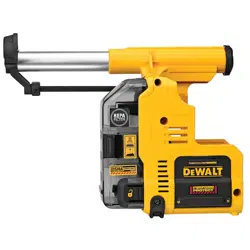Loading ...
Loading ...
Loading ...

English
3
• Do not use without dustbox and/or filter inplace.
• Do not use the appliance to pick up flammable or
combustible liquids, such as gasoline, or use in areas
where flammable or combustible liquids arepresent.
• Do not pick up anything that is burning or smoking,
such as cigarettes, matches or hotashes.
• To avoid spontaneous combustion, empty dust box
after eachuse.
• Do not leave dust extractor unattended when
battery is installed. Remove battery pack when not in
use and beforeservicing.
• Do not put any objects into the openings. Do not use
with any opening blocked; keep free of dust, lint, hair and
anything else that may reduce airflow.
WARNING: Use of this tool can generate and/
or disburse dust, which may cause serious and
permanent respiratory or other injury. Although the
filter material removes 99.97% of airborne particles
0.3 microns or greater, the dust extration system
may not capture all of the dust created by the drilling
operation. Always use NIOSH/OSHA approved
respiratory protection appropriate for the dust
exposure. Direct particles away from face andbody.
WARNING: Always wear proper personal hearing
protection that conforms to ANSI S12.6 (S3.19)
during use. Under some conditions and duration
of use, noise from this product may contribute to
hearingloss.
CAUTION: When not in use, place tool on its side
on a stable surface where it will not cause a
tripping or falling hazard. Some tools with large
battery packs will stand upright on the battery pack
but may be easily knockedover.
• Air vents often cover moving parts and should be
avoided. Loose clothes, jewelry or long hair can be
caught in movingparts.
SAVE THESE INSTRUCTIONS FOR
FUTURE USE
COMPONENTS (FIG. A)
WARNING: Never modify the power tool or any part
of it. Damage or personal injury couldresult.
Refer to Figure A at the beginning of this manual for a
complete list ofcomponents.
INTENDED USE
Your dust extraction system DWH303DH has been designed
for the extraction of dust in professional hammerdrilling
in masonry or concrete, and with solid drill bits mounted
to the power tool. DO NOT use for drilling plastic, wood or
metal. DO NOT use with hollow bits or corebits.
This dust extraction system will fit
DeWALT
20V Max cordless
SDS Plus hammers DCH273 andDCH274.
DO nOT use under wet conditions or in presence of
flammable liquids orgases.
The dust extraction system is an attachment for use with
professional powertools.
DO nOT let children come into contact with the tool.
Supervision is required when inexperienced operators use
thistool.
SPECIFICATIONS
Max Drilling Depth 4" (100 mm)
Max Drill Bit Length 6" (150 mm)
Max Drilling Diameter 5/8" (16 mm)
ASSEMBLY AND ADJUSTMENTS
WARNING: To reduce the risk of serious personal
injury, turn off tool and disconnect the tool
from the power source before making any
adjustments or removing/installing attachments
or accessories. An accidental start-up can
causeinjury.
Attaching and Removing the Dust
Extraction System
To Attach the Dust Extraction System
(Fig. A–C)
WARNING: To reduce the risk of personal injury,
ALWAYS operate the tool with the side handle
properly installed and securely tightened. Failure
to do so may result in the side handle slipping during
tool operation and subsequent loss of control. Hold
tool with both hands to maximizecontrol.
1. Remove the drill bit, side handle and the depth
adjustment rod, if attached to the rotaryhammer.
2. Attach supplied side handle
10
to thehammer.
3. Ensure the base release buttons
2
are depressed and
locked in the open position before attempting to fit the
dust extraction system to the rotaryhammer.
4. Insert hammer into the extractor, ensuring that both the
electrical connectors
13
14
and side handle support
groove
11
and locator
17
align. The base released
buttons will click into the closed position when hammer
is properly seated in theextractor.
Fig. B
11
17
2
3
Loading ...
Loading ...
Loading ...
